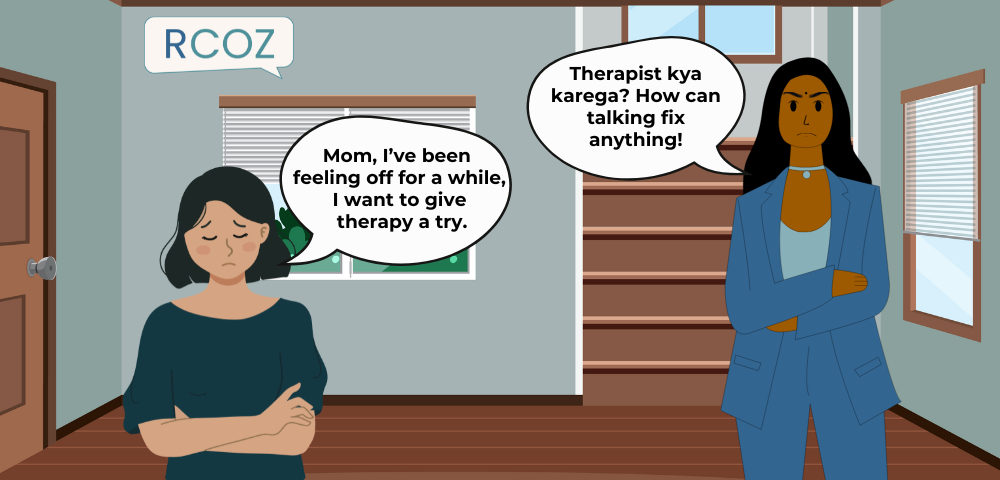“How can the therapist fix anything? All they do is talk!”
“How can talking fix anything?”
“These people prescribe medications that make you a zombie! Don’t take it!”
“Therapy is for the weak! Push through it and work hard!”
“What will people say if they know you are seeing a therapist! They will think you are crazy!”
These are the common refrains from South Asians regarding mental health and therapy. This is deeply rooted in their psyche and culture. They would rather hide any mental health issues for fear of being judged, seen as weak, or thought of as having something wrong with their family, which could lead to ostracization. This fear of stigma is so deeply rooted that they will not seek help from a therapist until the situation is dire, sometimes not even then. For older, first-generation South Asians, therapy remains an alien concept. Seeking outside help seems ridiculous when they wonder “Why pay for help when family elders can solve the problem?”
The Numbers Speak An Alarming Story
Per SAMHIN (South Asian Mental Health Initiative and Network)
[1]. Suicide is the fifth-leading cause of death among this population, as compared to the ninth-leading cause of death among Non-Hispanic white Americans
[2]. Among women aged between 15-24, Asian American females have the highest suicide rates among all racial and ethnic groups
[3]. Every seven hours an Asian American child is arrested for a violent crime
[4]. Asian American adolescent boys are twice as likely to have been physically abused and three times as likely to report sexual abuse as White American adolescent boys
Breaking Stigma Before It’s Too Late
If statistics alone are not enough, consider this: Rcoz was approached by a South Asian community grappling with the heartbreaking loss of a young life to suicide. In response, we delivered an awareness presentation, hoping to spark understanding. Yet, the devastation of this loss prompted a deeper call to action, driving us to intensify our mission to break the silence, dismantle stigma, and promote open conversations around mental health.
Why Is Seeking Therapy So Important?
Not every feeling of anxiety or “tension” needs to be seen by a therapist but when you are not able to live a normal life and function at your optimal level, one needs to stop and wonder what’s going on. Sometimes mental health issues can manifest as physical ailments and can pose challenges for healthcare providers in accurately diagnosing and treating underlying mental health conditions.
South Asians commonly experience psychological distress as physical symptoms. Mental health problems can manifest physically, such as sleep troubles, bodily pains, and stomach problems – SAPHA
What Can a Therapist Do?
Therapy is a form of treatment that aims to help resolve mental or emotional issues. Therapy can help people deal with these issues by teaching coping skills or working to eliminate them. – Medical News Today
A therapist can be a transformative partner in your journey, offering a safe, judgment-free space to explore your emotions, identify patterns, and develop tools to cope and heal. With their unbiased support, you can uncover the root causes of your challenges and work toward a healthier, more fulfilling life.
Seeking Therapy Is A Sign Of Strength Not Weakness!
It all starts with acknowledging you need help and then starting conversations. Talking about it normalizes what you are going through and hopefully brings it on par to you having a headache and addressing it. Seeking therapy is a sign of strength and not weakness. Sharing personal struggles with a therapist is confidential and does not reflect poorly on the individual or family.
I look forward to each session because, at the end of it, I feel inspired and try to encourage everyone I know to look into therapy for themselves. It’s not going to be overnight and who knows how I’ll feel another year from now, but even as I write this, it’s cathartic for me – Why more South Asians should consider therapy by Ahmed Sharma
My chronic illness had given me no choice but to quit my job and put my career aspirations on hold. Yet the cultural expectations echoed in my ears, rising to a roar as they reprimanded me: you’re a failure, you’re a failure.
I’ve now spent over four years in therapy, and it’s been one of the best decisions of my life. Therapy has shown me that keeping quiet about our struggles perpetuates shame, fear, and separateness. But discussing our traumas builds a bridge for deeper connection – Therapy Helped Me Find Pride in My South Asian Heritage by Brina Patel
Whether through therapy or other forms of support, taking the first step to seek help can be life-changing—and sometimes, life-saving. Together, we can build a world where seeking help is seen as a strength, not a weakness.
Finding Support That Fits You
At Rcoz, we advocate for therapy as a valuable tool for addressing mental health issues. However, we understand that healing can take many forms—whether it’s through a trusted friend, a supportive parent, a compassionate colleague, a caring doctor or a spiritual practice. On average, it takes people 11 years to seek help. Our mission is to shorten that gap and encourage individuals to get the support they need, in whatever form it may come.

